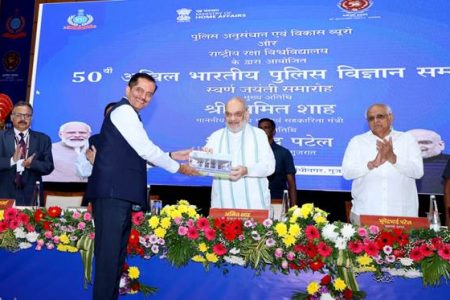Gandhinagar: Union Home Minister and Minister of Cooperation, Amit Shah, addressed the 50th All India Police Science Conference today, emphasizing the critical need to modernize and adapt India’s policing systems to address contemporary challenges. The event, held in Gandhinagar, saw the participation of Gujarat Chief Minister Bhupendra Patel, Union Home Secretary Govind Mohan, and Director General of the Bureau of Police Research and Development (BPR&D), Rajiv Kumar Sharma, along with several dignitaries.
In his keynote address, Shah highlighted the pivotal role of the Police Science Conference in keeping policing systems relevant in the fight against crime. He underscored the necessity of re-evaluating the structure, participation methods, and research dissemination processes, stressing that these should effectively benefit even the beat constables in police stations. According to the Home Minister, any system that remains unchanged for decades risks becoming obsolete, and the Police Science Conference must evolve to meet new realities.
Shah noted that India’s transformation into the world’s fifth-largest economy under Prime Minister Narendra Modi’s leadership has brought unprecedented challenges, particularly in the realm of internal security. He asserted that in the coming decade, the country’s criminal justice system would become the most modern, scientific, and efficient globally. He emphasized that the new criminal laws introduced by the Modi government prioritize citizen safety and constitutional rights, incorporating advanced technologies to ensure their relevance for years to come.
Highlighting the government’s progress, Shah pointed to the computerization of all 17,000 police stations and the integration of 22,000 courts into the e-court system. He also praised the establishment of digital databases such as the National Automated Fingerprint Identification System (NAFIS) and the Crime Multi-Agency Centre (Cri-MAC), which have revolutionized investigations and monitoring processes. He credited these advancements with making the justice system more transparent and accessible.
The Home Minister also addressed the nation’s internal security challenges, noting significant improvements in troubled regions like Kashmir, the Northeast, and Naxal-affected areas, where violence has been reduced by 70% in the last decade. He highlighted the government’s achievements in combating narcotics, with a record seizure of ₹35,000 crore worth of illegal drugs over the past ten years—six times higher than the preceding decade.
Shah stressed the importance of addressing emerging threats such as cybercrime, border security breaches, drone misuse, narcotics trafficking, and the dark web. He called for enhanced collaboration between the Police Science Conference and AI experts to utilize advanced technologies for crime prevention and judicial reforms. He urged the BPR&D to adopt a forward-looking approach, suggesting the organization of hackathons and other innovative initiatives to harness the full potential of collected data.
The conference also focused on topics such as new criminal laws, the role of forensic science, disaster management, policing in smart cities, and measures to address radicalization. Shah highlighted the transformative impact of these discussions, which he said are integral to creating a more efficient, responsive, and technology-driven policing system.
Shah called on the BPR&D to develop a comprehensive roadmap for the next decade, including annual and mid-term reviews, to ensure measurable progress in strengthening the criminal justice system. He concluded by stating that India’s law enforcement agencies must rise to meet both current and future challenges, positioning the nation as a global leader in internal security and justice.
The conference served as a platform to chart a transformative course for policing in India, aligning with the government’s vision of a secure and just society.

